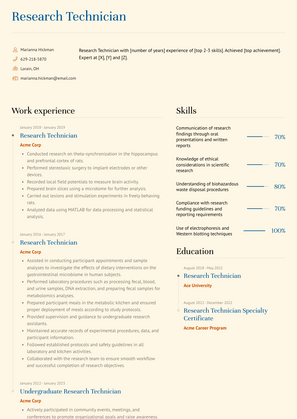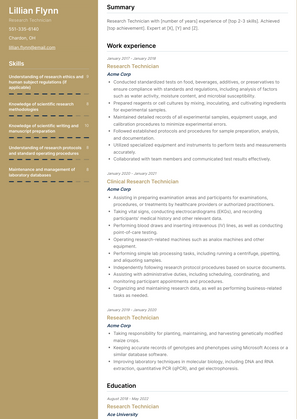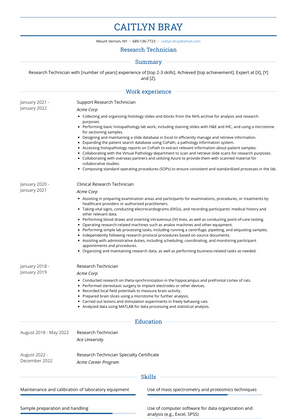3+ Research Technician Resume Examples and Templates
This page provides you with Research Technician resume samples to use to create your own resume with our easy-to-use resume builder. Below you'll find our how-to section that will guide you through each section of a Research Technician resume.



What Do Hiring Managers Look for in a Research Technician Resume
- Proficient in conducting scientific research and experiments under the supervision of researchers or scientists.
- Strong knowledge of laboratory techniques, equipment operation, and data collection methods.
- Skilled in preparing and maintaining research materials, specimens, and laboratory records.
- Ability to perform data analysis, interpret results, and assist in drawing conclusions.
- Proficiency in following research protocols, adhering to safety guidelines, and assisting in research publications or presentations.
How to Write a Research Technician Resume?
To write a professional Research Technician resume, follow these steps:
- Select the right Research Technician resume template.
- Write a professional summary at the top explaining your Research Technician’s experience and achievements.
- Follow the STAR method while writing your Research Technician resume’s work experience. Show what you were responsible for and what you achieved as a Research Technician.
- List your top Research Technician skills in a separate skills section.
How to Write Your Research Technician Resume Header?
Write the perfect Research Technician resume header by:
- Adding your full name at the top of the header.
- Add a photo to your resume if you are applying for jobs outside of the US. For applying to jobs within the US, avoid adding photo to your resume header.
- Add your current Research Technician position to the header to show relevance.
- Add your current city, your phone number and a professional email address.
- Finally, add a link to your portfolio to the Research Technician resume header. If there’s no portfolio link to add, consider adding a link to your LinkedIn profile instead.
Bad Research Technician Resume Example - Header Section
Caroline 9 W. Wakehurst St. Mount Vernon, NY 10550 Marital Status: Married, email: cooldude2022@gmail.com
Good Research Technician Resume Example - Header Section
Caroline Mendez, Mount Vernon, NY, Phone number: +1-555-555-5555, Link: linkedin/in/johndoe
Make sure to add a professional looking email address while writing your resume header. Let’s assume your name is John Doe - here is a formula you can use to create email addresses:
- firstnamelastname@email.com - johndoe@email.com
- firstname.lastname@email.com - john.doe@email.com
- lastname.firstname@email.com - doe.john@email.com
- f.lastname@email.com - j.doe@email.com
- l.firstname@email.com - d.john@email.com
- firstnamelastname12@email.com - johndoe12@email.com
For a Research Technician email, we recommend you either go with a custom domain name (john@johndoe.com) or select a very reputed email provider (Gmail or Outlook).
How to Write a Professional Research Technician Resume Summary?
Use this template to write the best Research Technician resume summary: Research Technician with [number of years] experience of [top 2-3 skills]. Achieved [top achievement]. Expert at [X], [Y] and [Z].
How to Write a Research Technician Resume Experience Section?
Here’s how you can write a job winning Research Technician resume experience section:
- Write your Research Technician work experience in a reverse chronological order.
- Use bullets instead of paragraphs to explain your Research Technician work experience.
- While describing your work experience focus on highlighting what you did and the impact you made (you can use numbers to describe your success as a Research Technician).
- Use action verbs in your bullet points.
Research Technician Resume Example
Research Technician
- Conducted routine research activities, including in vivo and in vitro based screens, to support scientific studies.
- Administered doses to laboratory animals and maintained their care and husbandry.
- Prepared and verified dosing solutions for administration, ensuring accuracy and adherence to protocols.
- Organized and prepared all individual study supplies on-site, ensuring timely availability for research activities.
- Managed and organized study data, study folders, and data forms, including data collection and entry.
- Collaborated with team members to ensure smooth workflow and adherence to study protocols and timelines.
Undergraduate Research Technician Resume Example
Undergraduate Research Technician
- Actively participated in community events, meetings, and conferences to promote organizational goals and raise awareness.
- Provided support during on-campus events, ensuring tasks were carried out efficiently and effectively.
- Conducted biodiversity and habitat assessments of local streams using appropriate techniques and tools.
- Assisted in training new members in various laboratory techniques, ensuring their understanding and competence.
- Supported small mammal trapping and releasing activities using pitfall and Sherman traps.
- Assisted in bird mist-netting and release for a Bird Diversity Index Study, contributing to data collection and analysis.
- Played a role in organizing the Annual Forestry Fair community outreach event, ensuring its success and positive impact.
Support Research Technician Resume Example
Support Research Technician
- Collecting and organizing histology slides and blocks from the NHS archive for analysis and research purposes.
- Performing basic histopathology lab work, including staining slides with H&E and IHC, and using a microtome for sectioning samples.
- Designing and maintaining a slide database in Excel to efficiently manage and retrieve information.
- Expanding the patient search database using CoPath, a pathology information system.
- Accessing histopathology reports on CoPath to extract relevant information about patient samples.
- Collaborating with the Virtual Pathology department to scan and retrieve slide scans for research purposes.
- Collaborating with overseas partners and utilizing Azure to provide them with scanned material for collaborative studies.
- Composing standard operating procedures (SOPs) to ensure consistent and standardized processes in the lab.
Clinical Research Technician Resume Example
Clinical Research Technician
- Assisting in preparing examination areas and participants for examinations, procedures, or treatments by healthcare providers or authorized practitioners.
- Taking vital signs, conducting electrocardiograms (EKGs), and recording participants' medical history and other relevant data.
- Performing blood draws and inserting intravenous (IV) lines, as well as conducting point-of-care testing.
- Operating research-related machines such as analox machines and other equipment.
- Performing simple lab processing tasks, including running a centrifuge, pipetting, and aliquoting samples.
- Independently following research protocol procedures based on source documents.
- Assisting with administrative duties, including scheduling, coordinating, and monitoring participant appointments and procedures.
- Organizing and maintaining research data, as well as performing business-related tasks as needed.
Research Technician Resume Example
Research Technician
- Taking responsibility for planting, maintaining, and harvesting genetically modified maize crops.
- Keeping accurate records of genotypes and phenotypes using Microsoft Access or a similar database software.
- Improving laboratory techniques in molecular biology, including DNA and RNA extraction, quantitative PCR (qPCR), and gel electrophoresis.
Research Technician Resume Example
Research Technician
- Conducted research on theta-synchronization in the hippocampus and prefrontal cortex of rats.
- Performed stereotaxic surgery to implant electrodes or other devices.
- Recorded local field potentials to measure brain activity.
- Prepared brain slices using a microtome for further analysis.
- Carried out lesions and stimulation experiments in freely behaving rats.
- Analyzed data using MATLAB for data processing and statistical analysis.
Research Technician Resume Example
Research Technician
- Conducted standardized tests on food, beverages, additives, or preservatives to ensure compliance with standards and regulations, including analysis of factors such as water activity, moisture content, and microbial susceptibility.
- Prepared reagents or cell cultures by mixing, inoculating, and cultivating ingredients for experimental samples.
- Maintained detailed records of all experimental samples, equipment usage, and calibration procedures to minimize experimental errors.
- Followed established protocols and procedures for sample preparation, analysis, and documentation.
- Utilized specialized equipment and instruments to perform tests and measurements accurately.
- Collaborated with team members and communicated test results effectively.
Research Technician Resume Example
Research Technician
- Assisted in conducting participant appointments and sample analyses to investigate the effects of dietary interventions on the gastrointestinal microbiome in human subjects.
- Performed laboratory procedures such as processing fecal, blood, and urine samples, DNA extraction, and preparing fecal samples for metabolomics analyses.
- Prepared participant meals in the metabolic kitchen and ensured proper deployment of meals according to study protocols.
- Provided supervision and guidance to undergraduate research assistants.
- Maintained accurate records of experimental procedures, data, and participant information.
- Followed established protocols and safety guidelines in all laboratory and kitchen activities.
- Collaborated with the research team to ensure smooth workflow and successful completion of research objectives.
Top Research Technician Resume Skills for 2023
- Laboratory techniques and equipment operation
- Knowledge of scientific research methodologies
- Data collection and analysis
- Ability to conduct literature reviews and research background information
- Experimental design and protocol development
- Sample preparation and handling
- Use of scientific software and analysis tools
- Knowledge of laboratory safety procedures and protocols
- Troubleshooting and problem-solving in experimental setups
- Maintenance and calibration of laboratory equipment
- Understanding of quality control and assurance processes
- Statistical analysis of research data
- Documentation and record-keeping of experimental procedures and results
- Knowledge of ethical considerations in scientific research
- Use of computer software for data organization and analysis (e.g., Excel, SPSS)
- Understanding of laboratory regulations and compliance (e.g., biosafety, chemical handling)
- Collaboration with research team members and principal investigators
- Communication of research findings through oral presentations and written reports
- Knowledge of experimental techniques specific to the research field
- Use of microscopy and imaging techniques
- Understanding of cell culture techniques and sterile practices
- Maintenance and monitoring of laboratory inventory and supplies
- Use of molecular biology techniques (e.g., DNA extraction, PCR)
- Knowledge of animal handling and experimental protocols (if applicable)
- Use of laboratory automation and robotics systems
- Understanding of research ethics and human subject regulations (if applicable)
- Preparation and maintenance of laboratory reagents and solutions
- Use of chromatography and spectroscopy techniques
- Understanding of research compliance and regulatory requirements
- Management and organization of research data and files
- Use of electrophoresis and Western blotting techniques
- Understanding of research protocols and standard operating procedures
- Statistical software and data analysis (e.g., R, MATLAB)
- Knowledge of bioinformatics and genomics tools
- Use of cell imaging and analysis software
- Understanding of biohazardous waste disposal procedures
- Knowledge of scientific writing and manuscript preparation
- Use of flow cytometry and cell sorting techniques
- Understanding of laboratory animal care and handling (if applicable)
- Compliance with research funding guidelines and reporting requirements
- Knowledge of tissue culture and cell line maintenance
- Use of analytical instrumentation (e.g., spectrophotometers, HPLC)
- Understanding of experimental animal models and treatments (if applicable)
- Maintenance and management of laboratory databases
- Use of mass spectrometry and proteomics techniques
- Understanding of research grant proposal development
How Long Should my Research Technician Resume be?
Your Research Technician resume length should be less than one or two pages maximum. Unless you have more than 25 years of experience, any resume that’s more than two pages would appear to be too long and risk getting rejected.
On an average, for Research Technician, we see most resumes have a length of 2. And, that’s why we advise you to keep the resume length appropriate to not get rejected.
Frequently Asked Questions (FAQs) for Research Technician Resume
-
What does a Research Technician do?
- A Research Technician provides support to scientific research projects by conducting experiments, collecting data, and maintaining laboratory equipment. They work under the supervision of scientists or principal investigators to facilitate research activities.
-
What qualifications are important for a Research Technician position?
- Qualifications typically include a bachelor's degree in a scientific field such as biology, chemistry, biochemistry, or a related discipline. Relevant laboratory experience, knowledge of research techniques, and familiarity with laboratory equipment are also important.
-
What kind of experience should a Research Technician highlight on their resume?
- Experience in laboratory techniques, such as PCR (Polymerase Chain Reaction), gel electrophoresis, microscopy, cell culture, or biochemical assays, is crucial for a Research Technician. Highlighting proficiency in data analysis, troubleshooting, and adherence to laboratory protocols is important.
-
How important is it for a Research Technician to demonstrate attention to detail on their resume?
- Attention to detail is critical for a Research Technician as they are responsible for conducting experiments accurately and recording data meticulously. Highlighting experience in following experimental protocols, maintaining accurate records, and identifying anomalies is essential.
-
Should a Research Technician include their experience with laboratory safety on their resume?
- Yes, mentioning experience with laboratory safety protocols, including handling hazardous materials, maintaining equipment, and ensuring compliance with safety regulations, can demonstrate the Technician's commitment to maintaining a safe work environment.
-
What soft skills are important for a Research Technician to highlight on their resume?
- Soft skills such as communication, teamwork, problem-solving, time management, and adaptability are crucial for a Research Technician. These skills contribute to effective collaboration with colleagues, troubleshooting experiments, and managing multiple tasks in a fast-paced research environment.
-
Is it necessary for a Research Technician to mention their experience with scientific literature review on their resume?
- Yes, mentioning experience with scientific literature review, including searching databases, summarizing research articles, and citing relevant studies, can demonstrate the Technician's ability to stay informed about current research developments and contribute to project planning.
-
How should a Research Technician tailor their resume for different research fields?
- A Research Technician should highlight experience and skills relevant to the specific research field they are applying to, whether it's molecular biology, neuroscience, pharmacology, or environmental science. Emphasizing familiarity with specialized techniques and equipment used in the field can be beneficial.
-
Should a Research Technician include their educational background on their resume?
- Yes, including educational background such as degrees, certifications, or relevant coursework in scientific disciplines is important. This provides credibility and demonstrates the foundational knowledge necessary for the role.
-
How can a Research Technician make their resume visually appealing and easy to read?
- Utilizing clear headings, bullet points to highlight key skills and experiences, and a professional layout are important aspects of resume formatting. Additionally, including specific examples of research projects or contributions to scientific publications can enhance the overall presentation of the resume.
Copyright ©2025 Workstory Inc.
